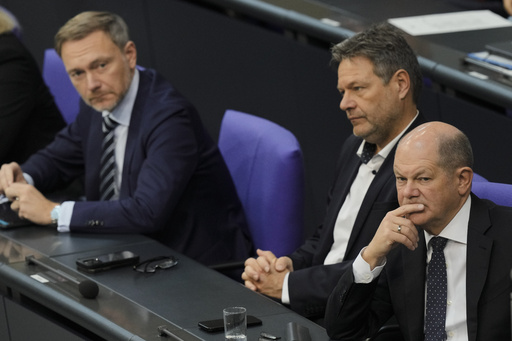
Germany’s Economic Challenges and Political Discontent
Germany’s economy is currently facing stagnation, prompting the ruling coalition to generate various proposals for revitalization. However, a consensus on the best path forward remains elusive as infighting among the members of Chancellor Olaf Scholz’s administration has raised doubts about their ability to enact solutions during the upcoming months prior to the next elections, scheduled for 11 months from now.
The pressing need for action is widely recognized, as Germany, the largest economy in Europe, is projected to experience a decline in growth for the second consecutive year in 2024. This downturn is attributed to various external factors as well as internal challenges such as bureaucratic obstacles and a lack of skilled labor necessary for economic expansion.
Finance Minister Christian Lindner highlighted the disarray within the coalition last week, stating, “There’s no lack of ideas; what we are short of is agreement among the governing parties.”
The coalition comprises three rival factions: Scholz’s Social Democrats, Vice Chancellor Robert Habeck’s environmentally focused Greens, and Lindner’s business-oriented Free Democrats, a party traditionally aligned with conservative values. This diverse mix formed an ambitious coalition in 2021 aiming to modernize Germany across various ideological spectrums.
While the government cites accomplishments like averting an energy crisis following the cessation of gas supplies from Russia and initiating military modernization along with social reforms, public perception leans toward viewing the administration as increasingly dysfunctional. Ifo economic research institute’s head, Clemens Fuest, remarked on television that it feels as if each party is already in election mode, implying that if leadership fails to unify the coalition, it might be time to dissolve it.
Recently, environmentalist Habeck suggested establishing a state investment fund to aid businesses, but his idea was swiftly dismissed by both Scholz and Lindner. Meanwhile, Lindner’s party organized a gathering with business leaders on the same day Scholz had scheduled a separate closed meeting with industry and union representatives. Scholz expressed a desire to avoid public spectacles that result in unresolved proposals, even as he excluded his coalition counterparts from his discussions with industry players.
Economic and financial matters are rife with division within the coalition. Left-leaning politicians advocate for significant state investment while opposing cuts to welfare programs, whereas Lindner’s Free Democrats are staunchly against tax increases and any alterations to Germany’s strict fiscal discipline regarding national debt, advocating instead for reduced spending in areas such as benefits for the unemployed.
The clash of ideas has led to difficulties in formulating the national budget, especially after Germany’s highest court annulled a government plan last November to redirect €60 billion originally designated for COVID-19 relief toward initiatives addressing climate change and modernization.
As a result, the coalition was forced to hastily reconfigure the 2024 budget, which included subsidy reductions that spurred protests from farmers. The friction persisted into the discussions regarding the 2025 budget, contributing to unfavorable outcomes in recent electoral campaigns.
Scholz, Lindner, and Habeck presented a budget proposal in July that featured increased allocations for defense and affordable housing, along with a stimulus plan, but internal disputes delayed progress, resulting in a revised agreement that took over a month to finalize. This budget is currently pending parliamentary approval, with lawmakers required to finalize it by November 14. The ongoing conflicts within the coalition have left some questioning whether the government can sustain itself beyond this deadline.
Opposition leader Friedrich Merz has voiced his concerns, declaring to ARD television that the government is essentially incapable of functioning and implied it may be at the end of its road. With little motivation for the ruling parties to risk early elections before the scheduled September date, as Merz’s Union bloc leads in the polls and the Free Democrats hover around the crucial 5% threshold for parliamentary representation, the outlook for improvement appears bleak.
Recent statements from government officials have only intensified skepticism regarding their stability. In October, Lindner remarked on the importance of stability for Germany but cautioned that “a government can itself become part of the problem.” Scholz, on the other hand, has been urging his coalition partners to maintain unity until their term concludes, emphasizing the need for those entrusted with mandates to fulfill their responsibilities. “No one should just slink away,” he asserted in an interview with ZDF, underlining his commitment to see through the government’s remaining assurances and obligations.
